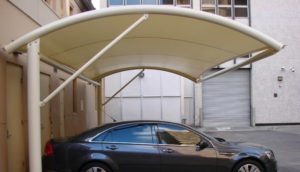Summer Safety Tips
 Summer Car Safety Tips
Summer Car Safety Tips
If you ever park outside during the summer months, your car will heat up quickly. Heat coming in through the windows is absorbed by the interior, and the glass acts as an insulator. The temperature in your car get up to 200 degrees, depending on the temperature outside, the kind of vehicle you have, and how long it has been in the sun. An interesting factoid, while dark colored cars may get hot a bit faster, after a period of time, both light and dark cars reach the same temperature. In addition, cracking the windows does not help. That may relieve the pressure in the vehicle and keep the windows from blowing out in the heat, but it doesn’t prevent the temperature from rising.
Here are some tips to be well-prepared for driving in the heat.
 1. Park in the shade. This may sound obvious but it’s easy to forget when you’re in a hurry and don’t want to walk too far in the heat. Be aware, however, that trees mean birds, and you may have debris or bird droppings on your car when you return. If you can’t park in the shade, pick the best direction. Try to park in the direction where the sun will be shining on your rear window or passenger side for most of the time it will be parked.
1. Park in the shade. This may sound obvious but it’s easy to forget when you’re in a hurry and don’t want to walk too far in the heat. Be aware, however, that trees mean birds, and you may have debris or bird droppings on your car when you return. If you can’t park in the shade, pick the best direction. Try to park in the direction where the sun will be shining on your rear window or passenger side for most of the time it will be parked.
2. Window Tinting/Sunshades. Mitigate some of the effects of the sun by having your windows tinted. Some states have strict window tinting laws so check with your local law enforcement. If window tinting isn’t in your budget right now, then you can eliminate some of the heat by purchasing a windshield sunshade that you place on the inside of your windshield when you leave your car. This prevents the sun from beating on your dashboard and steering wheel. Dashboards don’t like the sun or heat. If you don’t cover them, they can fade and crack. Steering wheels, of course, get extremely hot, cause burns to the touch, and cause unsafe driving when you can’t really grip the wheel. There are also removable side window screens, if you have passengers in the rear who want a little relief from the sun on long road trips.
3. Service your vehicle. In hot dry climates, cars need special care. Frequent oil changes and belt checks are a must. Batteries die faster than everyone thinks they will. Make sure fluids are full.
4. Items you should have in your car. Common sense says that you should always have a spare tire and a first aid kit. Here are some additional items that you might not think of that can help you beat the heat.
- Extra water, for drinking and/or for the car.
- Steering wheel cover. A cloth cover (not leather) make allow you to comfortably handle the steering wheel after the vehicle has been standing in the sun. You can also use a small towel or handkerchief. If you don’t have a windshield sunshade, place the small towel on a leather seat before you leave the car so you can get in and sit down when you return. If you’ve never had the experience of sitting on leather when you’re wearing shorts, and that car has been outside in 120 degrees for a couple of hours….ouch!
- Snacks, such as granola bars or small bags of crackers.
- Cooler or insulated shopping bag. If you are shopping and you have a bit of time before you can get home, a cooler with an ice pack or insulated shopping bag will keep those frozen items from melting, or that fresh fish safe, before you get there.
- Cell phone, so you can call if you get lost or get into trouble.
- First aid kit. Items you should consider include ice packs, ace bandages, wrist brace, sunscreen, tweezers, x-acto blade, batteries, (girl stuff), and various meds like Benadryl or Motrin.
- Emergency kit. Items you should consider include a flashlight, flares, jumper cables, blanket, extra clothes and gloves, paper towels, and some basic tools like wrenches, a ratchet and sockets, screwdrivers and pliers.
5.Items you should not have in your car. You can avoid cleaning bills and bad smells by making sure none of these items are left in your vehicle.
- Milk and other dairy products.
- Anything packaged under pressure, like hair spray or soda pop.
- Tapes, CDs, or DVDs.
- Sunscreen in a bottle. Buy little packets or towelettes.
- Crayons, candy, gum, lipstick.
- Credit cards or other cards with magnetic strips on plastic.
- Cleaning solutions with alcohol or ammonia.
- Anything that didn’t have a decent smell before it reached 115 isn’t going to smell any better after it’s been left exposed in direct sunlight all day.
- After shopping, check your trunk carefully to make sure nothing has fallen out of the grocery bags. You really don’t want to find those eggs or that salami a week later.

 Summer Car Safety Tips
Summer Car Safety Tips

